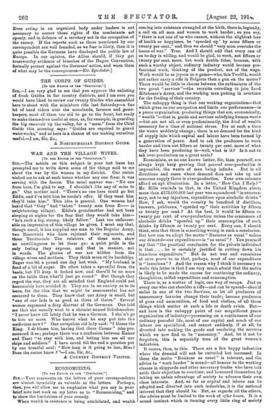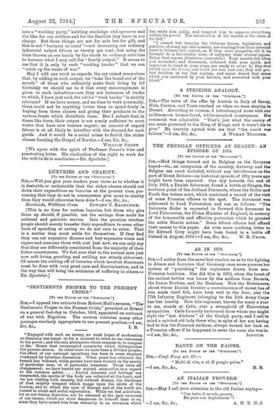ECONOMIZING.
[To THE EDITOR 05 7HZ -Srtcreroa."1
SIR,—Your comments on the letters of your correspondents are almost invariably as valuable as the letters. Perhaps, then, you will allow me to emphasize what you say in your brief note last week on my letter as to " Economizing," and to show the limitations of your remedy.
When wealth in existence is being annihilated, and wealth coming into existence strangled at the birth, there is, logically, a call on all men and women to work harder; as you say, " there is not one of us who cannot, without the slightest loss of health or happiness, be 'speeded up' by some fifteen or twenty per cent.," and thus we should "very soon overtake the losses of war." True. And I should add that every one of us to-day is willing, and would be glad, to work, not fifteen or twenty per cent. more, but work double tides, because, with such a worthy object, ordinary industry would become pro- fessional work, thinking of the product, not of the wage. Work would be as joyous as a game—who, this Twelfth, would not rather carry a rifle in Belgium than a gun on the moors ? There would be little to choose between the enthusiasm of the two great " services "—the recruits crowding to join Lord Kitchener's Army, and the working men putting in overtime for the feeding of their country.
The unhappy thing is that our working organization—that which gives us our occupation and limits our performance—is a peace organization, producing things that are, economically, " wealth "—that is, goods and services satisfying human wants —but are not all, or even predominantly, the kind of wealth necessary for a time of national stress. For at such a time the wants suddenly change; there is no demand for the kind of supply into which capital and labour have been turned by a generation of peace. And to ask the producers to work harder and turn out fifteen or twenty per cent. more of what they have been producing is—well, what is it? Is it not to ask over-production on a great scale ?
Economists, as no one knows better, Sir, than yourself, are always kept busy proving that general over-production is impossible, the wants of man being infinite. But in all directions and cases where demand does not take up and consume supply there is over-production. Your own columns afford an apt illustration. In a letter, "How Can I Help ?" Mr. Hills reminds us that, in the United Kingdom alone, more than E170,000,000 last year was squandered " in unneces- sary, not to say injurious, expenditure upon alcoholic drinks." How, I ask, would the country be benefited if distillers, brewers, publicans, " speeded up" their activities by fifteen or twenty per cent. ? At the best, it would be fifteen or twenty per cent. of over-production unless the consumers of alcoholic drinks "speeded up" their consumption of such drinks by fifteeen or twenty per cent. Every one, I should think, sees that there is something wrong in such a conclusion. But how can we adopt the motto " Business as usual" unless our demand—our expenditure—is "as usual" ? You yourself say that "the practical conclusion for the private individual is that . . . he is certainly justified in cutting down his luxurious expenditure." But do not war and conscience at once prove to us that, perhaps, most of our expenditure is " luxurious " ? And the reason why I think it necessary to write this letter is that I am very much afraid that the motto is likely to be made the excuse for continuing the ordinary, thoughtless, selfish expenditure and consumption.
There is, as a matter of logic, one way of escape. Just as every one who can shoulder a rifle—and can he spared—should enlist in one of the two Services, so let all producers of unnecessary luxuries change their trade; become producers of guns and ammunition, of food and clothes, of all those things which matter at such a life or death crisis. But— and here is the unhappy point of our magnificent peace organization of industry—presuming on a continuance of our ordinary peaceful life, most of our capital and much of our labour are specialized, and cannot suddenly, if at all, be diverted into making the goods and rendering the services which we now find to be " necessary." And, let it not be forgotten, this is especially true cf the great women's industries.
It comes, then, to this. There are a few happy industries where the demand will not be curtailed but increased. In these the motto "Business as usual" is relevant, and the advice to "work harder" is sound—all honour to the working classes in shipyards and other necessary trades who have laid. aside their objection to overtime, and honoured themselves by taking no unfair advantage of society to advance their own class interests. And, so far as capital and labour can be adapted and diverted into such industries, it is the national. interest that they should be. But, as regards all the others, the advice must be limited to the work of after hours. It is a sound instinct- which is turning every little ring of society into a " working party," knitting stockings and spencers and the like for our soldiers and for the families they leave in our charge. But these things are not for sale but for gift, and this is not "business as usual"—not increasing our ordinary industrial output fifteen or twenty per cent., but using the time thrown on our bands by the check to ordinary activities to increase what I may call the "family output." It seems to me that it is only by such "working harder" that we can "catch up the waste of war." May I add one word as regards the cry raised everywhere that, by adding to such output, we "take the bread out of the mouth" of those who ordinarily make their living by it P Certainly we should see to it that every encouragement is given to such industries—are they not instances of trades to which, I have just said, the advice " work harder " is strictly relevant P If we have money, and no time to work personally, there could not be anything better than to spend freely in buying from these classes and giving their products to the various funds which distribute them. But I submit that, in times like these, their output is not nearly sufficient to meet wants that have now become urgent ; no amount of unpaid labour is at all likely to interfere with the demand for such goods. And it would be a social crime to forbid the richer classes learning the Gospel of Service.—I am, Sir, &c., WILLIAM SMART.
[We agree with the spirit of Professor Smart's wise and penetrating letter. His vindication of the right to work for the well-to-do is conclusive.—ED. Spectator.]



































 Previous page
Previous page